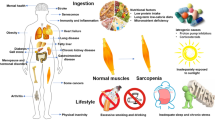Abstract
Proteomics provides an extremely powerful tool for the study of variations in protein expression between individuals, different disease states and different conditions. One of the major challenges facing the medical profession in the forthcoming decades is to understand the changes that occur in individuals as they become older and to attempt to develop means to improve the quality of life for the otherwise healthy ageing population. The present study describes the first phase of such an investigation in which the andaged protein composition of human skeletal muscle sample from young and aged subjects are compared. These results provide the beginning of a Human Aged Skeletal Muscle Profile reference map which is an essential first step to further investigations.
Similar content being viewed by others
Author information
Authors and Affiliations
Corresponding author
Rights and permissions
About this article
Cite this article
Cobon, G.S., Verrills, N., Papakostopoulos, P. et al. The proteomics of ageing. Biogerontology 3, 133–136 (2002). https://doi.org/10.1023/A:1015240304287
Issue Date:
DOI: https://doi.org/10.1023/A:1015240304287




